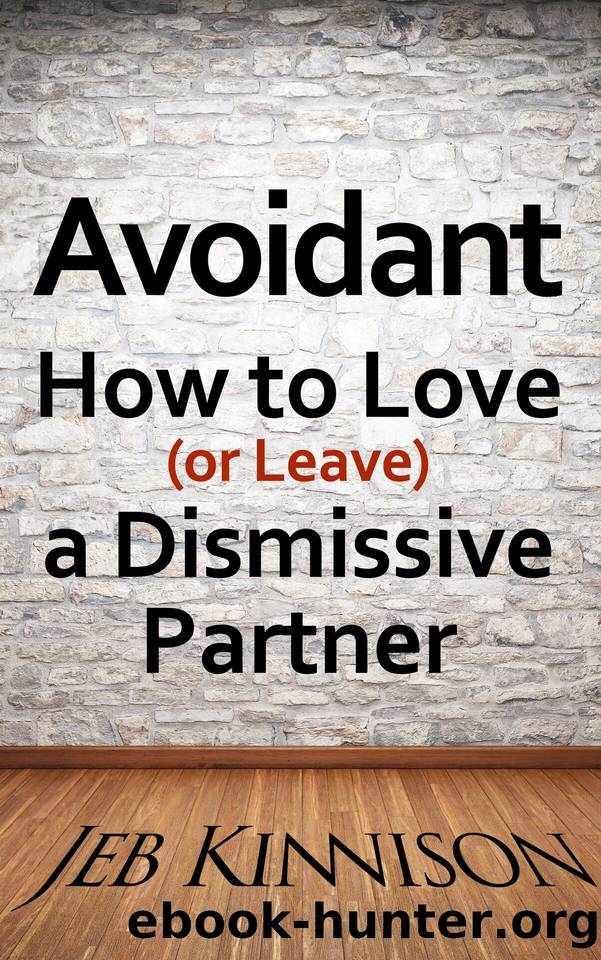Avoidant: How to Love (Or Leave) a Dismissive Partner by Jeb Kinnison

Author:Jeb Kinnison [Kinnison, Jeb]
Language: eng
Format: epub
Tags: Non-Fiction, Psychology, Relationships, Self-Help
ISBN: 9780991663668
Google: Gb-8oQEACAAJ
Amazon: B00O4QLPHI
Publisher: Jeb Kinnison
Published: 2014-10-01T23:00:00+00:00
Chapter 22
Sex and the Avoidant
Dismissive-Avoidants (like everyone else) like sex, and since they are generally not as interested in long-term attachment, they pursue relationships for the sex more than most people, and assume new relationships wonât last as long. Fearful-Avoidants are definitely interested in the idea of a long-term attachment, but also know from past experience that most of their relationships donât last, so they too make sexual attraction a prime motivation for seeking out companionship.
Avoidant peopleâs discomfort with closeness and negative models of others may interfere with psychological intimacy and interpersonal sensitivity in sexual situations. In addition, avoidant people may be willing to engage in sex without any consideration of establishing a long-term relationship , or even with the conviction that they do not want to be burdened by a long-term relationship. In other words, avoidance may be associated with measurable erotophobia (i.e., fearing or backing away from sex), sexual abstinence, or preference for impersonal, uncommitted sex. 71
Some Avoidants, like everyone, have absorbed the Fairy Tale model of romance, and they often have a hazy idea that someday they will meet their âsoulmateâ and find true relationship happiness; in the meantime they are just getting their needs met. But more commonly they think of romantic ideals as traps for the unwary and purely fictional :
Avoidant peopleâs preference for interpersonal distance and emotional detachment favors viewing sex and love as quite distinct; indeed, in the first studies of avoidance within the adult close-relationship domain, Hazan and Shaver (1987) found that avoidant people tended to view romantic love as a Hollywood fiction that does not exist in real life. 72
Dismissive males often appear to be âalphaâ males, since they are less concerned about how others feel, which can look like confidence and authority to someone who doesnât know them well. Many Anxious-Preoccupied women encounter these pseudo-Alphas and are smittenâthey see a confident, dominant man who doesnât care too much about being responsive, and that excites their sexual and attachment system. Going after one of these men, they may have the misfortune of catching one, only to discover after a year or two together that he is not loyal and will not âprotectâ them, in fact may start in with passive-aggressive or even violent abuse when he feels too pushed for responsiveness he cannot give. We saw an example of this in the last chapter about Ray and Janay Rice.
[B]ecause avoidant strategies are associated with extreme self-reliance, personal control, and defensive self-image inflation⦠avoidant people may use sex to maximize control over a partner, to gain social prestige, or to enhance self-esteem, all without much regard for a partnerâs feelings. In fact, avoidant peopleâs sexual behavior may be focused selfishly on their own needs in combination with dismissal of or blindness to a partnerâs sexual wishes. Avoidance also, paradoxically, may promote sexual promiscuity powered by insecurity, narcissism, or a wish to elevate oneâs self-image or standing in the estimation of oneâs peers. This kind of self-promotion through sexual conquest can occur in the absence of intense sexual interest and without much enjoyment of sex per se.
Download
This site does not store any files on its server. We only index and link to content provided by other sites. Please contact the content providers to delete copyright contents if any and email us, we'll remove relevant links or contents immediately.
Spare by Prince Harry The Duke of Sussex(5196)
Machine Learning at Scale with H2O by Gregory Keys | David Whiting(4313)
Fairy Tale by Stephen King(3396)
Will by Will Smith(2919)
The Bullet Journal Method by Ryder Carroll(2572)
Hooked: A Dark, Contemporary Romance (Never After Series) by Emily McIntire(2554)
It Starts With Us (It Ends with Us #2) by Colleen Hoover(2367)
Rationality by Steven Pinker(2363)
Can't Hurt Me: Master Your Mind and Defy the Odds - Clean Edition by David Goggins(2341)
Friends, Lovers, and the Big Terrible Thing by Matthew Perry(2230)
The Becoming by Nora Roberts(2201)
Love on the Brain by Ali Hazelwood(2075)
A Short History of War by Jeremy Black(1848)
HBR's 10 Must Reads 2022 by Harvard Business Review(1844)
The Strength In Our Scars by Bianca Sparacino(1843)
A Game of Thrones (The Illustrated Edition) by George R. R. Martin(1744)
Leviathan Falls (The Expanse Book 9) by James S. A. Corey(1743)
515945210 by Unknown(1666)
Bewilderment by Richard Powers(1620)
